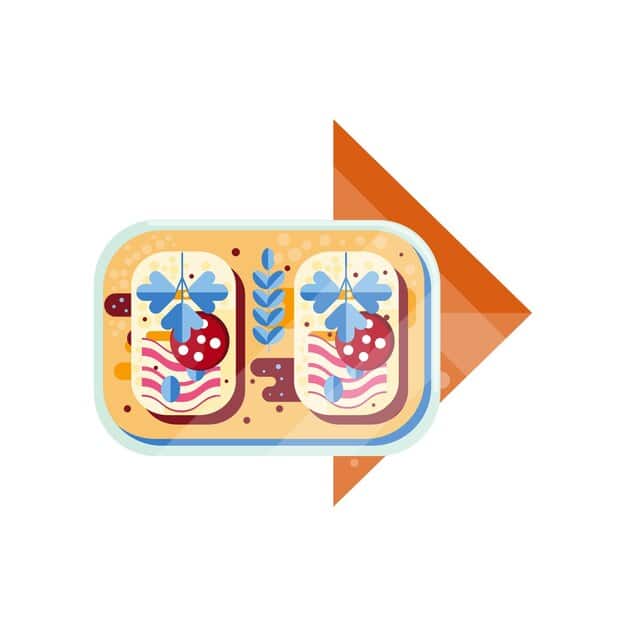The Latest Gut Health Research: How Probiotics Boost Digestion

The Latest Research on Gut Health: How Probiotics Can Improve Your Digestion explores the beneficial impact of probiotics on digestive health, highlighting recent studies that demonstrate their effectiveness in enhancing gut flora and overall well-being.
The digestive system, often referred to as the gut, plays a crucial role in overall health and well-being. Recent scientific advancements have shed light on the importance of gut health, particularly the impact of probiotics. The Latest Research on Gut Health: How Probiotics Can Improve Your Digestion reveals how these beneficial bacteria can significantly enhance digestive processes and contribute to a healthier lifestyle.
Understanding the Gut Microbiome: An Overview
The gut microbiome is a complex ecosystem of trillions of microorganisms, including bacteria, fungi, viruses, and other microbes, residing in the digestive tract. This community of microbes significantly influences various aspects of human health, from digestion and nutrient absorption to immune function and mental well-being.
What Constitutes a Healthy Gut Microbiome?
A healthy gut microbiome is characterized by a diverse and balanced community of microorganisms. This balance ensures optimal digestion, nutrient absorption, and immune response.
Key components of a healthy gut microbiome include:
- Diversity: A wide variety of microbial species.
- Balance: A proper ratio of beneficial to harmful bacteria.
- Resilience: The ability to recover from disturbances, such as antibiotics or poor diet.
Factors Influencing Gut Microbiome Composition
Numerous factors can affect the composition and function of the gut microbiome.
- Diet: A diet rich in fiber, fruits, and vegetables promotes the growth of beneficial bacteria, while a diet high in processed foods, sugar, and unhealthy fats can disrupt the microbial balance.
- Antibiotics: These medications can kill both harmful and beneficial bacteria, leading to imbalances in the gut microbiome.
- Stress: Chronic stress can negatively impact gut health and alter the composition of the gut microbiota.
- Environment: Exposure to different environments and hygiene practices can influence the types of microbes that colonize the gut.

Maintaining a healthy gut microbiome is essential for overall health. A balanced gut supports efficient digestion, strengthens the immune system, and promotes mental well-being. Understanding the factors that influence gut microbiome composition can help individuals make informed choices to support their gut health.
The Role of Probiotics in Gut Health
Probiotics are live microorganisms that, when administered in adequate amounts, confer a health benefit on the host. These beneficial bacteria can help restore and maintain a healthy balance in the gut microbiome, supporting various aspects of digestive and overall health.
How Probiotics Work
Probiotics exert their beneficial effects through several mechanisms.
Primary functions of probiotics include:
- Balancing Gut Bacteria: Probiotics can help restore the balance of gut bacteria by increasing the number of beneficial bacteria and suppressing the growth of harmful bacteria.
- Improving Gut Barrier Function: Probiotics can strengthen the gut barrier, preventing harmful substances from leaking into the bloodstream.
- Modulating the Immune System: Probiotics can stimulate the immune system, enhancing its ability to fight off infections and reducing inflammation.
Different Types of Probiotics
Various types of probiotics exist, each with unique properties and health benefits. Understanding the different strains can help individuals choose the most appropriate probiotics for their specific needs.
Common types of probiotics include:
- Lactobacillus: Found in yogurt and fermented foods, Lactobacillus strains can help improve digestion, boost the immune system, and alleviate symptoms of lactose intolerance.
- Bifidobacterium: Commonly found in dairy products, Bifidobacterium strains can help reduce symptoms of irritable bowel syndrome (IBS) and enhance gut health.
- Saccharomyces boulardii: A type of yeast probiotic, Saccharomyces boulardii can help prevent and treat diarrhea associated with antibiotic use.
Benefits of Probiotics Beyond Digestion
In addition to improving digestion, probiotics offer a range of other health benefits.
- Immune System Support: Probiotics can enhance immune function, reducing the risk of infections and allergies.
- Mental Health: Emerging research suggests a link between gut health and mental well-being, with probiotics potentially alleviating symptoms of anxiety and depression.
- Skin Health: Probiotics may help improve skin conditions such as eczema and acne by reducing inflammation and promoting a healthy gut-skin axis.
Probiotics play a vital role in maintaining and improving gut health. By balancing gut bacteria, enhancing gut barrier function, and modulating the immune system, probiotics offer a wide array of health benefits. Understanding the different types of probiotics and their specific functions can help individuals make informed choices to support their overall well-being.
Latest Research on Probiotics and Digestive Health
Recent studies have provided valuable insights into the efficacy of probiotics in improving digestive health. These findings highlight the potential of probiotics to address various digestive disorders and promote overall well-being.
Probiotics for Irritable Bowel Syndrome (IBS)
IBS is a common gastrointestinal disorder characterized by abdominal pain, bloating, and changes in bowel habits. Clinical trials have demonstrated that certain probiotic strains can alleviate these symptoms and improve the quality of life for individuals with IBS.
Benefits of probiotics for IBS include:
- Reduction in Abdominal Pain: Probiotics can help reduce the intensity and frequency of abdominal pain associated with IBS.
- Decreased Bloating: Certain probiotic strains can alleviate bloating and gas, common symptoms of IBS.
- Improved Bowel Habits: Probiotics can help regulate bowel movements, reducing both constipation and diarrhea in individuals with IBS.
Probiotics for Inflammatory Bowel Disease (IBD)
IBD, including Crohn’s disease and ulcerative colitis, involves chronic inflammation of the digestive tract. While probiotics are not a primary treatment for IBD, some studies suggest that they may help manage symptoms and prevent flare-ups.
Potential benefits of probiotics for IBD include:
- Reduced Inflammation: Certain probiotic strains can modulate the immune response, reducing inflammation in the gut.
- Prevention of Flare-Ups: Probiotics may help maintain remission in individuals with IBD, preventing the recurrence of symptoms.
- Improved Gut Barrier Function: Probiotics can strengthen the gut barrier, reducing the leakage of harmful substances into the bloodstream.
Probiotics for Antibiotic-Associated Diarrhea (AAD)
AAD is a common side effect of antibiotic use, caused by the disruption of the gut microbiome. Probiotics have been shown to be effective in preventing and treating AAD by restoring the balance of gut bacteria.

Benefits of probiotics for AAD include:
- Prevention of Diarrhea: Probiotics can reduce the risk of developing diarrhea during and after antibiotic treatment.
- Shorter Duration of Diarrhea: Probiotics can shorten the duration of AAD, reducing discomfort and inconvenience.
- Restoration of Gut Microbiome: Probiotics can help restore the balance of gut bacteria, promoting a healthy digestive system.
Recent research supports the use of probiotics as a valuable tool for improving digestive health. Probiotics have shown promise in alleviating symptoms of IBS, managing IBD, and preventing AAD. As research continues to evolve, probiotics may become an increasingly important component of digestive health management.
Choosing the Right Probiotic Supplement
Selecting the right probiotic supplement involves considering various factors to ensure that the chosen product meets individual needs and provides the desired health benefits. Understanding the composition, quality, and specific benefits of different probiotic supplements can help individuals make informed decisions.
Factors to Consider When Choosing a Probiotic
Several factors can influence the effectiveness of a probiotic supplement.
Important considerations include:
- Strain Specificity: Different probiotic strains offer different health benefits. Choose a supplement containing strains that have been clinically proven to address your specific needs.
- CFU Count: CFU (colony-forming units) indicates the number of live bacteria in each dose. A higher CFU count may be more effective, but it’s also important to consider the strain specificity.
- Survival Rate: Some probiotics are formulated to survive stomach acid and reach the intestines, where they can exert their beneficial effects. Look for supplements with enteric coatings or other protective measures.
Reading Supplement Labels
Understanding how to read supplement labels can help consumers make informed choices.
Key information on supplement labels includes:
- Strain Names: Look for specific strain names, such as Lactobacillus rhamnosus GG, rather than just the genus (e.g., Lactobacillus).
- CFU Count: Check the number of CFUs per dose to ensure an adequate amount of live bacteria.
- Ingredients: Be aware of any added ingredients, such as fillers, additives, or allergens.
Consulting with Healthcare Professionals
Consulting with a healthcare professional is advisable before starting any new supplement regimen.
Healthcare professionals can provide personalized recommendations based on individual health needs and medical history.
Why to consult with healthcare professionals:
- Personalized Recommendations: Healthcare professionals can assess individual health needs and provide tailored recommendations.
- Safety Considerations: Healthcare professionals can help identify potential interactions with medications or other health conditions.
- Monitoring Progress: Healthcare professionals can monitor progress and adjust the probiotic regimen as needed.
Choosing the right probiotic supplement involves careful consideration of strain specificity, CFU count, survival rate, and individual health needs. Reading supplement labels and consulting with healthcare professionals can help individuals make informed decisions to support their digestive and overall health.
Dietary Strategies to Enhance Probiotic Effects
While probiotic supplements can provide beneficial bacteria to the gut, dietary strategies play a crucial role in supporting the growth and activity of these bacteria. Consuming a diet rich in prebiotic fibers and fermented foods can enhance the effects of probiotics and promote a healthy gut microbiome.
Prebiotic Fibers: Fueling Probiotics
Prebiotics are non-digestible fibers that serve as food for beneficial bacteria in the gut. By consuming prebiotic-rich foods, individuals can provide nourishment for probiotics and support their growth and activity.
Good prebiotics sources include:
- Onions and Garlic: These vegetables contain inulin, a type of prebiotic fiber that promotes the growth of Bifidobacteria in the gut.
- Asparagus: Another good source of inulin, asparagus can help support a healthy gut microbiome.
- Bananas: Green bananas are rich in resistant starch, a type of prebiotic fiber that feeds beneficial bacteria.
Fermented Foods: A Natural Source of Probiotics
Fermented foods are naturally rich in probiotics, providing a diverse array of beneficial bacteria to the gut. Including fermented foods in the diet can help enhance the effects of probiotic supplements and promote a balanced gut microbiome.
Fermented foods to add in your diet:
- Yogurt: A well-known source of probiotics, yogurt contains live and active cultures of Lactobacillus and Bifidobacterium.
- Kefir: A fermented milk drink, kefir is even more diverse in probiotic strains than yogurt, offering a wide range of health benefits.
- Sauerkraut: Fermented cabbage, sauerkraut is rich in probiotics and can help improve digestion and immune function.
The Synergistic Effect of Probiotics and Diet
Combining probiotic supplements with a prebiotic-rich diet and fermented foods can create a synergistic effect, maximizing the benefits for gut health. This holistic approach supports the growth, activity, and diversity of beneficial bacteria in the gut, promoting optimal digestive and overall well-being.
Following these strategies helps you to:
- Promote Bacterial Growth: Prebiotic fibers provide nourishment for probiotics, supporting their growth and activity in the gut.
- Enhance Probiotic Diversity: Fermented foods introduce a variety of beneficial bacteria to the gut, increasing microbial diversity.
- Support Overall Gut Health: Combining probiotics with a healthy diet promotes a balanced gut microbiome, supporting efficient digestion, immune function, and mental well-being.
Dietary strategies play a crucial role in enhancing the effects of probiotics and promoting a healthy gut microbiome. By consuming prebiotic-rich foods and fermented foods, individuals can support the growth and activity of beneficial bacteria in the gut, maximizing the benefits for digestive and overall health.
Potential Side Effects and Precautions
While probiotics are generally considered safe for most individuals, some potential side effects and precautions should be considered. Understanding these factors can help individuals use probiotics safely and effectively.
Common Side Effects
Most individuals experience few or no side effects when taking probiotics. However, some common side effects may occur, particularly when starting a new probiotic regimen.
What to expect:
- Digestive Discomfort: Some individuals may experience mild digestive discomfort, such as gas, bloating, or diarrhea, particularly during the first few days of taking probiotics.
- Allergic Reactions: Although rare, allergic reactions to probiotics can occur. Symptoms may include skin rash, itching, or difficulty breathing.
Who Should Exercise Caution
Certain individuals may need to exercise caution when using probiotics.
People that need to be cautious are:
- Individuals with Compromised Immune Systems: Probiotics may pose a risk to individuals with severely compromised immune systems, such as those undergoing chemotherapy or organ transplantation.
- Individuals with Severe Illnesses: Probiotics should be used with caution in individuals with severe illnesses, such as acute pancreatitis or severe infections.
- Pregnant and Breastfeeding Women: While probiotics are generally considered safe during pregnancy and breastfeeding, it’s best to consult with a healthcare professional before use.
Interactions with Medications
Probiotics may interact with certain medications, such as antibiotics and immunosuppressants. It’s important to inform healthcare providers about all medications and supplements being taken to avoid potential interactions.
These are the interactions:
- Antibiotics: Antibiotics can kill both harmful and beneficial bacteria, potentially reducing the effectiveness of probiotics. It’s best to take probiotics at a different time of day than antibiotics.
- Immunosuppressants: Probiotics may stimulate the immune system, potentially interfering with the effects of immunosuppressant medications.
While probiotics are generally safe, potential side effects and precautions should be considered. Individuals with compromised immune systems, severe illnesses, or those taking certain medications may need to exercise caution. Consulting with healthcare professionals can help ensure the safe and effective use of probiotics.
| Key Point | Brief Description |
|---|---|
| 🦠 Gut Microbiome | Complex ecosystem of microorganisms in the digestive tract essential for health. |
| 💊 Probiotics Role | Live beneficial bacteria that help balance gut flora, improving digestion and immunity. |
| 🥗 Diet & Probiotics | Prebiotic-rich foods and fermented foods enhance probiotic benefits, supporting gut health. |
| ⚠️ Precautions | Consult healthcare provider, esp. for immune compromised individuals, or those with severe illnesses. |
Frequently Asked Questions (FAQs)
▼
Probiotics are live microorganisms intended to benefit the host when consumed, by improving or restoring the gut flora. They work by balancing the gut bacteria, enhancing the gut barrier, and modulating the immune system.
▼
Excellent food sources of natural probiotics include yogurt, kefir, sauerkraut, kimchi, kombucha, and other fermented foods. These options introduce beneficial bacteria directly into your digestive system.
▼
Yes, certain strains of probiotics can help reduce bloating and gas. They aid in breaking down food components and improving digestion, which can alleviate these common digestive issues.
▼
The time it takes for probiotics to work varies from person to person. Some individuals may notice improvements within a few days, while others may require several weeks to experience significant benefits.
▼
Most individuals experience few or no side effects when taking probiotics. However, some may experience mild digestive discomfort such as gas, bloating, or diarrhea, particularly when starting a new probiotic regimen.
Conclusion
In conclusion, recent research underscores the significant potential of probiotics in enhancing digestive health and overall well-being. By understanding the gut microbiome, choosing the right probiotic supplements, and adopting dietary strategies to support probiotic effects, individuals can take proactive steps to improve their digestive health and enjoy a healthier lifestyle.





